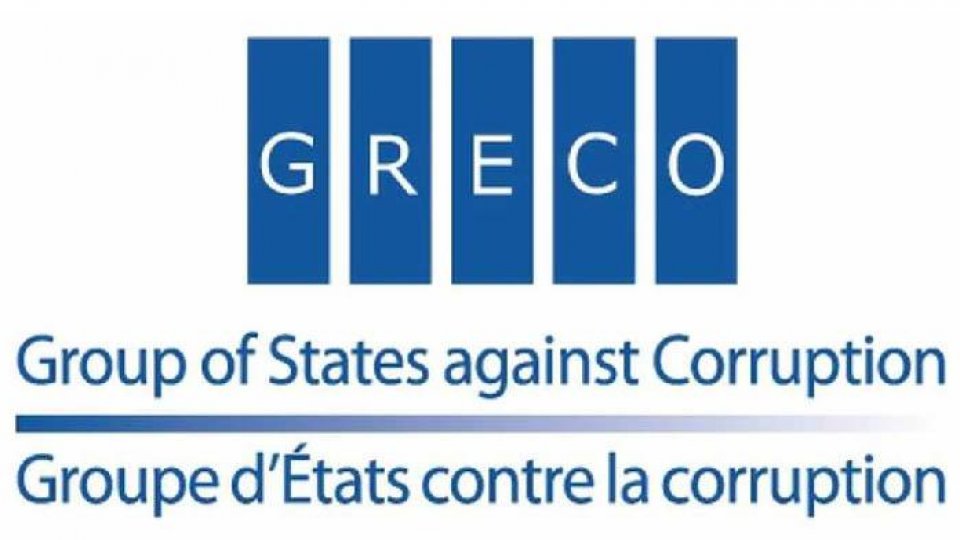GRECO regrets lack of progress in Romania on measures to combat corruption
GRECO has requested that the Romanian authorities report back on progress achieved by 30 June 2020.

Articol de Radiojurnal, 09 Iulie 2019, 22:41
Romania has made very little progress to put in place measures to prevent corruption among parliamentarians, judges and prosecutors and to address the concerns raised by its controversial judicial reform, says the Council of Europe’s anti-corruption body (GRECO) in two reports published today in Strasbourg.
GRECO calls on Romanian authorities to take determined action to achieve tangible progress as soon as possible. It welcomes, in this context, that on 4 June the Romanian Prime Minister announced the intention to abandon the controversial judicial reforms.
In a compliance report assessing progress in implementing measures recommended in 2015 to prevent corruption in respect of MPs, judges and prosecutors, GRECO concludes that Romania has only fully complied with four 13 recommendations, whilst it has partly implemented three and not implemented six (see the Romanian version of the compliance report)
In a follow up report evaluating compliance with the recommendations issued in an ad hoc report concerning the judicial reform prepared under its urgent evaluation procedure in 2018, GRECO finds that the Romanian authorities have only implemented one out of five recommendations (see the Romanian version of the follow-up report).
With respect to MPs, GRECO points out that the Romanian authorities have not yet reviewed, as requested, the rules and practices of the legislative process. Despite GRECO’s appeal to limit the use of emergency procedures to exceptional circumstances, authorities continued resorting to them for adopting important legal amendments.
Other shortcomings are that no effective mechanism to enforce the code of conduct of parliamentarians has been set up and that the scope of incrimination of conflicts of interest remains limited. GRECO also regrets that a robust set of restrictions on gifts for parliamentarians has not been introduced yet, and that application of sanctions for MPs who were found incompatible or in conflict of interest following a final court decision remains ineffective in practice. No progress has been made either concerning implementation of rules regulating lobbying.
GRECO acknowledges as a positive step review of the system of immunities by the Chamber of Deputies and introduction of criteria and grounds for lifting parliamentary immunity, but calls upon authorities to adopt similar provisions for the Senate and to ensure their effective implementation.
With regard to reforms in the justice system, GRECO warns that most recent attempts of the Romanian authorities to reduce the statute of limitations for certain corruption offences, if adopted into law, would seriously undermine the fight against corruption. Adoption by the Supreme Council of Magistracy (SCM) of the Integrity Plan of the judiciary puts in place some anti-corruption awareness-raising measures, but there is a need to strengthen the role and effectiveness of those performing managerial functions at courts and public prosecution services.
GRECO is particularly critical of the lack of action to address the need for objective selection criteria when appointing and dismissing prosecutors, and to enhance the role of the SCM in the process. It also regrets that recent legislative amendments and the case law of the Constitutional Court have increased the role of the executive in the appointments of senior prosecutorial functions. In fact, the consequences of legislative amendments relating to top prosecutors in Romania constitute an issue of serious concern for GRECO. The continued attacks by political actors on top prosecutorial functions, the dismissal of the Head of the National Anti-Corruption Directorate and an attempt to dismiss the Prosecutor General strengthen the suspicions as to the genuine objectives of these amendments, adopted through urgent procedures falling short of rule of law standards.
In its follow up to the 2018 ad hoc evaluation report, GRECO acknowledges some progress achieved by eliminating incompatibilities for judges and prosecutors and welcomes some initial measures on the early retirement of prosecutors and judges. However, it regrets that no tangible results have been achieved yet to address most of existing shortcomings.
GRECO is deeply concerned by the fact that authorities have disregarded recommendation to abandon setting-up of the section for investigation of offences in the judiciary. Report warns that the new legislation includes several amendments relating to appointments and dismissals of senior prosecutors, functional independence of prosecutors, personal liability of judges and prosecutors, which, taken together, represent serious threats to the independence of the judiciary.
Since issues addressed in the ad hoc report are particularly relevant to the 4th round evaluation assessing anti-corruption measures in respect of MPs, judges and prosecutors, GRECO decided to continue evaluating Romania’s compliance with the pending recommendations contained in the two reports under the 4th round on-going compliance procedure.
Considering that Romania’s low level of compliance is “globally unsatisfactory”, the country will remain subject to GRECO’s non-compliance procedure.
GRECO has requested that the Romanian authorities report back on progress achieved by 30 June 2020.
Source:Council of Europe Press Unit














